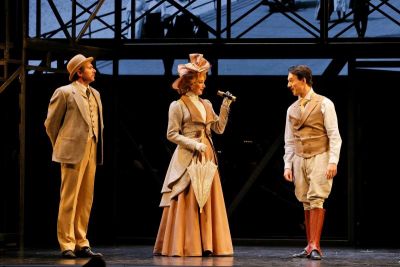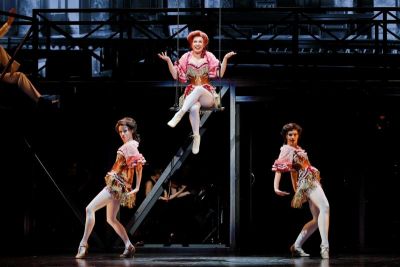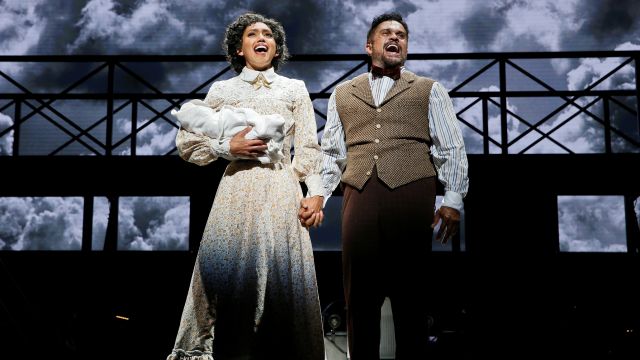Ragtime - the Musical
For what looks like being The Production Company’s second last show, they have mounted a sumptuous, all-stops-out Ragtime - a cast of thirty (including twelve ensemble), a twenty piece orchestra under Guy Noble, choreography by Dana Jolly, wonderful period (1900s east coast USA) costumes by Isaac Lummus - and a deceptively simple but clever stage design by Christina Smith. The period and key, iconic locations (Ellis Island, Atlantic City boardwalk and beach, a mansion at New Rochelle) are established by original black and white photographs projected on a huge cyclorama.
Of course, this production doesn’t have (couldn’t have) the reputed US$10 million budget of the 1998 Broadway show, but all the elements work so well here that it looks, sounds and feels dazzlingly first class. If any skimping went on, you won’t notice. Director Roger Hodgman brings all the elements together brilliantly, not just in performance and singing but in the way he uses the stage, walkway balcony above and stairs either side, positioning his cast in anything from big, busy ensemble scenes to intimate two-handers and soliloquies so as to add layers of meaning to the three intertwined story strands.
 Ragtime is a bold choice: although critically acclaimed and much loved and anticipated here by many, it’s not necessarily a sure-fire hit and never has been despite several revivals. Its ambitious story, an emotionally astute adaptation of the 1975 Doctorow novel, is richer, darker and more complex than most popular music theatre shows. It depicts three key ethnic groups: the white upper and middle classes (who see themselves as the ‘real Americans’), the African-Americans, creating their own culture, particularly with the ‘new music’ (i.e. ‘ragtime’) and the floods of immigrants arriving at Ellis Island, drawn by the promise of ‘America’. The show’s final ‘optimism’ - a happy ending for some - is selective and fragile. Terrence McNally’s book creates an impressionistic picture of ‘America’ at the beginning of what would be called - or was called then - the ‘American century’ - prosperous, optimistic, patriotic. The height of America’s ‘belle epoque’ before WWI. But underneath the ordered surface, things are not so peachy.
Ragtime is a bold choice: although critically acclaimed and much loved and anticipated here by many, it’s not necessarily a sure-fire hit and never has been despite several revivals. Its ambitious story, an emotionally astute adaptation of the 1975 Doctorow novel, is richer, darker and more complex than most popular music theatre shows. It depicts three key ethnic groups: the white upper and middle classes (who see themselves as the ‘real Americans’), the African-Americans, creating their own culture, particularly with the ‘new music’ (i.e. ‘ragtime’) and the floods of immigrants arriving at Ellis Island, drawn by the promise of ‘America’. The show’s final ‘optimism’ - a happy ending for some - is selective and fragile. Terrence McNally’s book creates an impressionistic picture of ‘America’ at the beginning of what would be called - or was called then - the ‘American century’ - prosperous, optimistic, patriotic. The height of America’s ‘belle epoque’ before WWI. But underneath the ordered surface, things are not so peachy.
There’s a white, upper-middle-class family at La Rochelle - Mother (Georgina Hopson), Father (Adam Murphy), Mother’s Younger Brother (Finn Alexander), Grandfather (John McTernan) and the Little Boy (either Kempton Maloney or Hudson Sharp). It is Mother’s story: her life and her ideas are changed by her impulsive generosity and her emotional flowering - taking in an unwed mother, defying her stolid husband and finding an unexpected love...
 It is also the story of Coalhouse Walker Jnr (a powerful, charming and heartbreaking Kurt Kansley), Harlem musician, exponent of the ‘new music’, proud and optimistic - he even has a T-model Ford! - who falls victim of mindless racism. And it the story of Tateh (Alexander Lewis in a spritely, witty and indomitable persona), the Latvian Jewish immigrant, a widower, who arrives with his young daughter and nothing else but hope and his artistic talent.
It is also the story of Coalhouse Walker Jnr (a powerful, charming and heartbreaking Kurt Kansley), Harlem musician, exponent of the ‘new music’, proud and optimistic - he even has a T-model Ford! - who falls victim of mindless racism. And it the story of Tateh (Alexander Lewis in a spritely, witty and indomitable persona), the Latvian Jewish immigrant, a widower, who arrives with his young daughter and nothing else but hope and his artistic talent.
These fictional characters bump into real historical figures who illustrate the tenor of the changing times: Houdini (Louis Loucente) another immigrant who provides the metaphor of escape; scandalous showgirl Evelyn Nesbit (Mackenzie Dunn) - illustrating the salacious but hypocritical fascination with sex - and disposal celebrity; tycoon Henry Ford (John O’May), mass production on the assembly line; super-rich banker J P Morgan; and fearless activist anarchist Emma Goldman (Sage Douglas), inciting industrial unrest.
 Ragtime is not without its flaws and I would not be the first to point them out. Purists might object the simplification of the novel. Well, yes, but it the stage adaptation runs only two and a half hours - and still some say it’s about too much. There are creaky plot contrivances, such as why Coalhouse’s girlfriend Sarah (a very touching Chloe Zuel) should abandon her newborn child at La Rochelle, or how Tateh achieves success quite so quickly, or how Younger Brother becomes a revolutionary. But what musical - or opera! - is not redolent with contrivance? Stephen Flaherty’s score has the thematic ragtime spine, but combines many musical styles, sometimes sliding into pastiche and is obliged at times to jump from ragtime piano to a belter power ballad... But so what? What matters is that all these elements meld in such a way that we ignore the contrivances, we accept that the characters are ‘types’ and we see that the combination of the three storylines enriches each of them. What matters is the emotions evoked in us by music, story, character and spectacle. This production positively bursts onto the stage and at the end of just the opening number an involuntary ‘wow’ escaped me. As the show rolled on I appreciated (a little more coolly) what Mr Hodgman and his collaborators had seamlessly done: made an exciting and satisfying and thought provoking show.
Ragtime is not without its flaws and I would not be the first to point them out. Purists might object the simplification of the novel. Well, yes, but it the stage adaptation runs only two and a half hours - and still some say it’s about too much. There are creaky plot contrivances, such as why Coalhouse’s girlfriend Sarah (a very touching Chloe Zuel) should abandon her newborn child at La Rochelle, or how Tateh achieves success quite so quickly, or how Younger Brother becomes a revolutionary. But what musical - or opera! - is not redolent with contrivance? Stephen Flaherty’s score has the thematic ragtime spine, but combines many musical styles, sometimes sliding into pastiche and is obliged at times to jump from ragtime piano to a belter power ballad... But so what? What matters is that all these elements meld in such a way that we ignore the contrivances, we accept that the characters are ‘types’ and we see that the combination of the three storylines enriches each of them. What matters is the emotions evoked in us by music, story, character and spectacle. This production positively bursts onto the stage and at the end of just the opening number an involuntary ‘wow’ escaped me. As the show rolled on I appreciated (a little more coolly) what Mr Hodgman and his collaborators had seamlessly done: made an exciting and satisfying and thought provoking show.
Michael Brindley

Subscribe to our E-Newsletter, buy our latest print edition or find a Performing Arts book at Book Nook.

